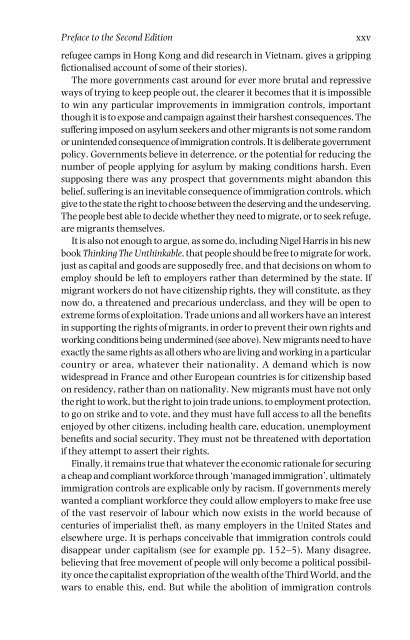Open%20borders%20The%20case%20against%20immigration%20controls%20-%20Teresa%20Hayter
Open%20borders%20The%20case%20against%20immigration%20controls%20-%20Teresa%20Hayter
Open%20borders%20The%20case%20against%20immigration%20controls%20-%20Teresa%20Hayter
Create successful ePaper yourself
Turn your PDF publications into a flip-book with our unique Google optimized e-Paper software.
Preface to the Second Edition xxv<br />
refugee camps in Hong Kong and did research in Vietnam, gives a gripping<br />
fictionalised account of some of their stories).<br />
The more governments cast around for ever more brutal and repressive<br />
ways of trying to keep people out, the clearer it becomes that it is impossible<br />
to win any particular improvements in immigration controls, important<br />
though it is to expose and campaign against their harshest consequences. The<br />
suffering imposed on asylum seekers and other migrants is not some random<br />
or unintended consequence of immigration controls. It is deliberate government<br />
policy. Governments believe in deterrence, or the potential for reducing the<br />
number of people applying for asylum by making conditions harsh. Even<br />
supposing there was any prospect that governments might abandon this<br />
belief, suffering is an inevitable consequence of immigration controls, which<br />
give to the state the right to choose between the deserving and the undeserving.<br />
The people best able to decide whether they need to migrate, or to seek refuge,<br />
are migrants themselves.<br />
It is also not enough to argue, as some do, including Nigel Harris in his new<br />
book Thinking The Unthinkable, that people should be free to migrate for work,<br />
just as capital and goods are supposedly free, and that decisions on whom to<br />
employ should be left to employers rather than determined by the state. If<br />
migrant workers do not have citizenship rights, they will constitute, as they<br />
now do, a threatened and precarious underclass, and they will be open to<br />
extreme forms of exploitation. Trade unions and all workers have an interest<br />
in supporting the rights of migrants, in order to prevent their own rights and<br />
working conditions being undermined (see above). New migrants need to have<br />
exactly the same rights as all others who are living and working in a particular<br />
country or area, whatever their nationality. A demand which is now<br />
widespread in France and other European countries is for citizenship based<br />
on residency, rather than on nationality. New migrants must have not only<br />
the right to work, but the right to join trade unions, to employment protection,<br />
to go on strike and to vote, and they must have full access to all the benefits<br />
enjoyed by other citizens, including health care, education, unemployment<br />
benefits and social security. They must not be threatened with deportation<br />
if they attempt to assert their rights.<br />
Finally, it remains true that whatever the economic rationale for securing<br />
a cheap and compliant workforce through ‘managed immigration’, ultimately<br />
immigration controls are explicable only by racism. If governments merely<br />
wanted a compliant workforce they could allow employers to make free use<br />
of the vast reservoir of labour which now exists in the world because of<br />
centuries of imperialist theft, as many employers in the United States and<br />
elsewhere urge. It is perhaps conceivable that immigration controls could<br />
disappear under capitalism (see for example pp. 152–5). Many disagree,<br />
believing that free movement of people will only become a political possibility<br />
once the capitalist expropriation of the wealth of the Third World, and the<br />
wars to enable this, end. But while the abolition of immigration controls


